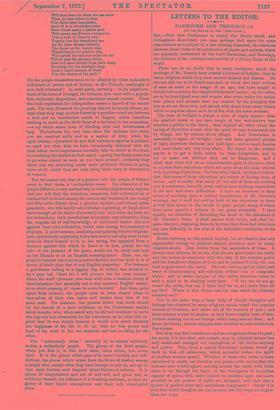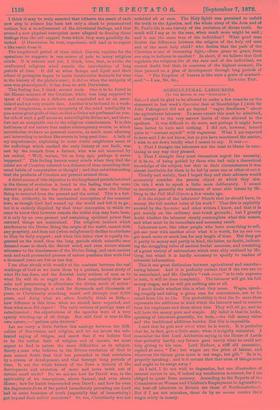LETTERS TO THE EDITOR.
DARWINISM AND THEOLOGY.—I.
ETO THE EDITOR OF THE " SPECTATOR."J
SIR,—Now that Parliament is closed, the Treaty saved, and Livingstone discovered, you may perhaps find space for some observations on a subject of a less exciting character, the relations between those views of the production of plants and animals which are popularly understood by the word Darwinism, and Theology, the doctrine of the existence and activity of a Divine Ruler of the world.
There can be no doubt that in many irreligious minds the writings of Mr. Darwin have created a fervour of delight ; that in many religious minds they have created anxiety and distresa. On the one side are to be found men such as those who have written of man as made in the image of an ape, and have sought to elevate into a science the supposed failures of nature ; on the other, are to be found good men and women who wince under the notion that plants and animals were not created by the Almighty fiat just as we see them now, and shrink with dread from every theory which in anywise shows us to be of kin with the lower animals.
The time of twilight is always a time of vague alarms ; then the gnarled trunk or the bare bough of the well-known tree becomes a goblin to the fancy ; then beyond all other times the saying of Epictetus is true, that the mind of man is harassed not by things, but by notions about things. And Darwinism is essentially a region of twilight ; here and there splendid gleams of light, elsewhere darkness and half-light ; and so men's fancies and men's fears are very busy there. My object in the present papers is to get a little nearer to these hobgoblins, and to try to make out whether they are so dangerous ; and I think that there will be no inconsiderable gain in the mere effort to express these objections which are more often felt than uttered with anything of precision ; for this will, I think, be found to show, first, that many of these objections are rather of feeling than of reason ; and secondly, that many (if not all) of them are nothing new in substance, but only novel and so more striking expressions of old and well-worn difficulties. I have no intention in these letters of entering upon a critical examination of Mr. Darwin's writings, but I shall try and lay hold of the objections to them as they float about in the minds of good people, many of whom have never opened a volume of our great naturalist. I have equally no intention of discussing the truth or the falsehood of Mr. Darwin's views. I shall assume their truth, and shall in- quire whether, supposing them to be true, they do in fact introduce any new difficulty in the way of the theocratic conception of the universe.
Before entering on this special inquiry, let me observe that any appreciated change in physical science produces pain in many religious minds. This results from the association of ideas. A devout man believes, let us say, that the sun goes round the earth, and this notion he associates with the idea of the creative power and the beneficent designs of God, and he praises God for the sun that so goes round the earth. The two notions get by habit and want of discriminating self-reflection welded into a composite whole ; and to shake one part of this entire structure seems to such a mind to be shaking every part. "If the sun do not go round the earth, how can I bless God for it, as I have done all my life ? Where is that divine care for man which has hitherto consoled me ?"
Just in the same way, a large body of devout thoughts and feelings has clustered in many religious minds round the popular notions of Creation, and above all, of the creation of man ; and these notions cannot be shaken, as they have roughly been of late, without shaking too those feelings which hang around them ; and hence inevitably, sorrow and pain have resulted to such minds from Darwinism.
But they may find consolation and encouragement from the past ; for surely it is true that each certain step in physical science has only raised and enlarged oar conceptions of the Divine majesty and power. Who, from a merely devotional interest, would go back to that old astronomy, which prevailed before the spirit of modern science arose? Whether of these two views is more calculated to excite our devotion and praise,—the notion that the heavens were a solid sphere, moving around the earth, with little holes to let through the light ; or the conception of boundless regions of space, with stars infinite in number, more and more revealed as our powers of sight are enlarged, and each star a system of perfect order and marvellous complexity ? Surely it is true that God's thoughts are not as ours, but Ills ways are higher than our ways. I think it may be truly asserted that hitherto the result of each new step in science has been not only a shock to preconceived notions, but a re-adjustment of the devotional feelings, and that around a new physical conception more adapted to develop those feelings than the old support from which they were painfully de- tached. If Darwinism be true, experience will lead us to expect a like result from it.
The lengthened period of time which Darwin requires for the operations he suggests is one source of pain to many religious minds. It is curious and yet, I think, true, that, as a rule, the uneducated religious mind resents the introduction of long periods of time. It did so when Scrope and Lyell and their school of geologists began to make incalculable demands for time in the history of the globe's crust ; it did so when the antiquity of man was promulgated ; it has done so with Darwinism.
This feeling has, I think, several roots. One is to be found in the Mosaic account of the Creation, which was long supposed to speak of Creation as a definite and concluded act at an ascer- tained and not very remote date. Another is to be found in a weak- ness of imagination, a mere incapacity of the mind intelligibly to pass across great gulfs of time, so that a divine act performed on yon- der side of such a gulf seems an unintelligible divine act, and there- fore not an acceptable one to the religious consciousness. It is this feebleness of our nature that makes contemporary events, in which nevertheless we have no personal concern, so much more affecting and interesting to us than like events in long-past time. A lady of ray acquaintance, explaining to some rustic neighbours some of the sufferings which marked the early history of our faith, was met by the remark from a farmer, who was not unmoved by her recital, "Well, ma'am, 'tis so long ago, perhaps it never happened." This feeling haunts many minds when they find the initial act of Creation referred to a distance of time exceeding their anal habits of computation or thought ; and that notwithstanding that the products of Creation are present around them.
A third source of this objection to the lengthened periods involved in the theory of evolution is found in the feeling that the more distant in point of time the divine act is, the more the Divine Being is removed from the present and the actual. This is a feel- ing due, evidently, to the mechanical conception of the cosmical laws, as though God had wound up the world and left it to go ; but it is entirely dispelled by that truer conception in which we come to know that however remote the initial step may have been, it is only by an ever-present and sustaining spiritual power that outward things are maintained. The religious instinct which attributes to the Divine Being the origin of the world, cannot with any propriety, and does not (when enlightened) decline to attribute to Him its daily support ; and when this latter view is equally im- pressed on the mind, then the long periods which scientific men demand cease to shock the devout mind, and even nature almost witnesses to the timelessness of the Divine Being, and each ancient rock and each protracted process of nature proclaim that with God a thousand years are but as one day.
I am often struck with wonder at the contrast between the real workings of God as we learn them by a patient, honest study of what He has done, and the feverish hasty notions of men as to what He will do or ought to do. How majestically slow and calm and persevering is oftentimes the divine mode of action! The sea eating through a rock for thousands and thousands of years, or Christianity attacking moral evil through near 2,000 years, and doing what we often fretfully think so little,— how different is this from what we should have expected, and from what men did expect ! The early notions of geology were all catadysmical ; the expectations of the apostles were of a very speedy winding-up of all things. But still God is true to His own nature,—" patiens quia asternus."
Let me carry a little further this analogy between the diffi- culties of Darwinism and religion, and let me invert the cele- brated saying of Origen, and assert that if we believe God to be the author both of religion and of nature, we must expect to find in nature the same difficulties as in religion. Surely a man who believes in the Divine revelation of God to man cannot doubt that God has proceeded in that revelation by a system of development, and that through long periods of time. Is not the whole history of the Jews a history of tfie development and evolution of more and more truth out of certain small seeds? Do we not see how far David was, in the spirituality of his conceptions, above Samuel, and even above Moses ; how far Isaiah transcended even David ; and how far even the degenerate Jews of the period immediately preceding our Lord had in some branches of truth (especially that of immortality) got beyond their nobler ancestors? So, too, Christianity was not
unfolded all at once. The Holy Spirit was promised to unfold the truth to the Apostles, and the whole story of the Acts and of St. Paul's life is one history of the evolution of divine truth. So. much will I say as to the race, when much more might be said ; and is not the same true of the individual? What good man doubts the difference between the religion of the holy old man and of the most holy child? who doubts that the path of the Christian is one of increasing light,—from grace to grace, from one step in holiness to another? In short, if we believe that God regulates the religious life of the race and of the individual, we doubt but that, in concerns of the highest moment, He- does proceed on a plan of development through long periods of time. "The kingdom of heaven is like unto a grain of mustard-



































 Previous page
Previous page